Canada Climate Masterplan
Air Date: Week of December 2, 2016
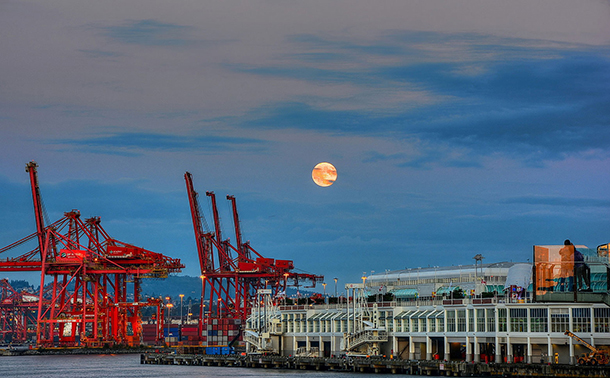
A harvest moon hangs over Coal Harbor, Vancouver B.C. (Photo: tdlucas5000, Flickr CC BY 2.0)
This week Canada pushed forward on its initiative to rid the country of coal-fired power plants by 2030, and put a minimum national price on carbon by 2019. At the same time, the Trudeau administration rejected a new tar sands pipeline but approved the expansion of two pipelines that already bring oil sands crude to refineries in British Columbia and Wisconsin. Host Steve Curwood caught up with David Heurtel, Minister of Sustainable Development, Environment and the Fight Against Climate Change in Québec Province, to talk about present and future carbon markets, the future for coal and Canada’s climate stewardship efforts.
Transcript
CURWOOD: From the Jennifer and Ted Stanley Studios at the University of Massachusetts, Boston and PRI, this is Living on Earth. I’m Steve Curwood. To keep promises made at the Paris climate summit, Canada is unrolling a master plan to deal with climate change, including a phase-out of coal by 2030 and a phase-in of carbon pricing by 2019. Provincial premiers and indigenous leaders plan to meet with Prime Minister Justin Trudeau on December 9 to seal the deal.
Mr. Trudeau has also nixed a controversial new pipeline to carry heavy tars sands oil from Alberta to the West coast. But he also approved the expansion of two existing pipelines that would carry the heavy crude from Alberta to refineries in British Columbia and Wisconsin. Mr. Trudeau says the Trans Mountain pipeline expansion planned by Kinder-Morgan to the west will meet the highest standards of environmental protection.
TRUDEAU: Aside from the many and obvious economic benefits, we approved this project because it meets the strictest of environmental standards and fits within our national climate plan. We will require that Kinder-Morgan meet or exceed all 157 of the binding conditions set out by the National Energy Board.
As for the phase-out of coal, all but four provinces have already stopped using it or committed to do so. Québec has led carbon pricing with a cap-and-trade program that is already linked to California and set to begin shortly with Ontario, and British Columbia already has a carbon tax. David Heurtel is Minister of Sustainable Development, the Environment and the Fight Against Climate Change for Québec, and he’s on the line now from Québec City. David, welcome back to Living on Earth.
HEURTEL: Great to be with you, Steve.
CURWOOD: What effect do you think phasing out coal will have on trade relations between the Canada and the U.S.? We have a new president coming in who really likes coal.
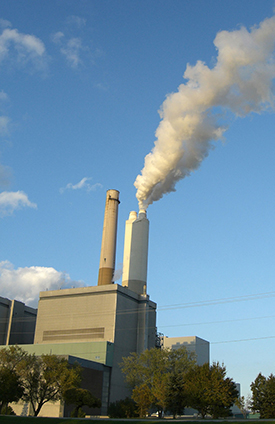
Smoke billows out of the now-defunct coal-fired generating station in Lambton, Ontario (Photo: Toban B., Flickr CC BY-NC 2.0)
HEURTEL: I think it's a clear signal from the Canadian government that from a national Canadian perspective our federal government is serious about the fighting of climate change, and that's a change from the previous federal government. But one thing that's very important to remember is that both in the Canadian system and the U.S. system -- states have the brunt of jurisdictions having to do with climate change. Québec set up its cap and trade system with California while we had a national government that would not even say the words climate change and we were able to develop this and have Ontario come on board and BC set up its carbon tax, and so while our federal government the same time was pulling out of Kyoto, was pulling out of up, until Paris what was the most significant international agreement on climate, we were still able as provinces to move ahead with significant moves on the fight against climate change. And we're seeing what we saw in Marrakech with the president of California, Washington state, Vermont, and several other states there is still this will to work and to collaborate with Canadian provinces with Mexico. And also we have the Under2 coalition which over 160 governments from around the world that have all committed to reducing emissions by 80 to 95 percent by 2050, and that's representing over 1 Billion people on the planet and that includes California, and it actually was an initiative that was started by California. So it shows you that at that level, yes, obviously national governments have an important role to play in the fight against coming change but also I think it's important to stress that states, provinces, what they call U.N. speak infranational governments, have a major role and can still move ahead even if a national government isn't moving at the same pace.
CURWOOD: Now, as I understand it all the premiers and the indigenous leaders will come together on December 9th to finalize the Canadian climate plan that Prime Minister Trudeau promised in Paris last year. What do you expect that plan to look like after that meeting?
HEURTEL: Well, all the environment ministers of Canada, including the federal minister met in Montréal actually hosted them last month for a conference that was set to prepare this December 9 meeting. And so, at that conference all the ministers agreed on the basic principles of a pan-Canadian framework to coordinate efforts in the fight against climate change. Now, obviously certain provinces did not agree with the federal government's proposal to impose a carbon tax in the provinces that do not have a price on carbon yet, namely Saskatchewan. but since then other provinces have announced that they will put a price on carbon. So now, Nova Scotia, for example, has decided to choose a cap and trade system, which is similar to the one that was adopted by Québec. Québec is already linked to California's cap-and-trade system, and we already have the largest cap-and-trade system in North America, and federal plan recognizes the Québec-California System as a valid equivalent to a carbon tax.
CURWOOD: Let me make sure I understand this right. So, there's an option then for each province.
HEURTEL: There is.
CURWOOD: You can go -- you can go with cap and trade, join with Québec and Ottawa and be part of the California system as well, or you can have a carbon tax and the government, the Federal government, will set this carbon tax rate.
HEURTEL: Exactly. So jurisdictions like Alberta and British Columbia have already set up a carbon tax. So, the criteria is the Federal government says, well the tax has to at least reach $50 by 2022 -- $50 a ton by 2022. So, it has to be stringent enough because if your tax is too low, you're not going to be able to reduce emissions significantly. So, it has to be high enough to force industry to reduce emissions. While a cap-and-trade system, the system already integrates reduction targets, so they're an effective way of not only reducing emissions, but also generating revenue to invest in transitioning your economy out of fossil feels.
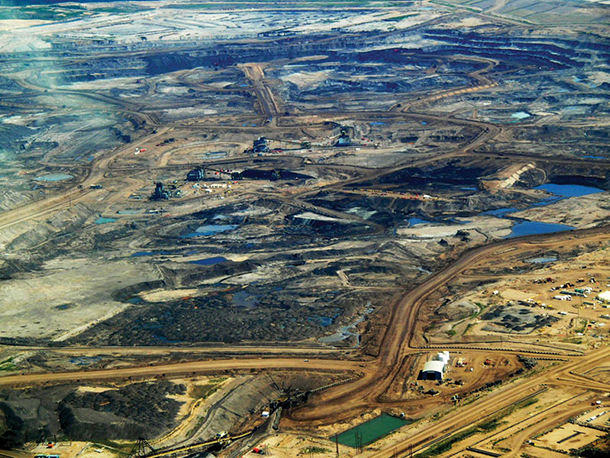
Tar sands surface mines in Alberta, Canada (Photo: Howl Arts Collective, Flickr CC BY 2.0)
CURWOOD: By the way, Minister Heurtel, when it comes to a carbon tax where does the revenue from that tax go in the Canadian system?
HEURTEL: Well, the Canadian system -- the federal government has said if you use -- if a province uses the federally imposed tax, well then the federal government has promised to redistribute those revenues to that province, and so that province will have a certain form of flexibility into what it does. In BC, for example, their system has been revenue neutral. So it's redistributed in certain elements of transitioning their economy coming out of fossils, but also there are, for example, tax breaks or tax advantages to offset the impact of the tax on the consumer. While I was in Québec, the cap-and-trade revenues are entirely reinvested in Québec's green fund which invests in programs to transition out of the fossil fuel-based economy to invest in clean tech, to invest in the electrification of transportation, for example, through our green fund, so through our cap-and-trade carbon market revenues, we can offer an $8,000 per person rebate for anyone wanting to buy an electric car. We're also in a network of charging stations. We already have 1,200 charging stations across Québec. We're investing in waste management, for example, so we have different areas. We have about 30 different orientations through our climate change action plan, which spends the money, which is generated from cap and trade. So, so far in almost three years now, we've generated over $1.4 billion through cap-and-trade, and that's reinvested in Québec's economy, into clean tech, into adaptation measures, into mitigation measures in a wide series of fields.
CURWOOD: Now, since Québec has been a pioneer in the cap-and-trade here in North America -- you partnered up with California, how is that deal going right now?
HEURTEL: Well, it's going very well. I remember when we linked up in 2014 there were a lot of naysayers and critics saying that it wouldn't work and we must say this partnership is been a tremendous. I was in Marrakesh a few weeks ago for COP 22, the international climate conference. I was there with my Californian counterparts along with Ontario and I think the best evidence of this partnership being truly a success is one: both parties been able to harmonize.
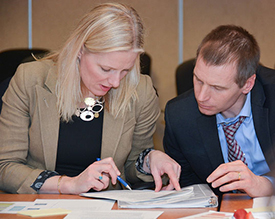
Catherine McKenna (left), Canada’s Minister of Environment and Climate Change, has vowed to make Canada’s electricity 90% free of carbon emissions by 2030. (Photo: Pembina Institute, Flickr CC BY-NC-ND 2.0)
Think about it, you have two infranational states, two states from national countries, one from Canada, one from the U.S., coming together on cap-and-trade, speaking two different languages and we've been able to harmonize our regulations, our laws and we've had now nine auctions, credit auctions because the cap-and-trade system, four times a year you auction off these carbon credits that companies have to buy to respect the laws and regulations regarding cap-and-trade, and these auctions have been very successful. The last auction just Québec which was last week, we announced the results of the last auction. We raised $155 million, and that's a very successful amount.
CURWOOD: And another state, Ontario, is ready to join. Is that correct?
HEURTEL: Yes, Ontario has not only announced that they will join the Québec California cap-and-trade system, but they've actually passed legislation. The Ontario legislature last Spring passed legislature that will let Ontario set up its cap-and-trade system, but we're working right now to link up with Ontario, and therefore Ontario will join the Québec-California system. So, now you're going to have over 50 percent of Canada's economy and over 60 percent of its population having the same cap-and-trade system, which will be linked to California. Last August, I was in Guadalajara, Mexico, for the Summit of the Americas on climate change. I was there representing Québec. Premier Kathleen Wynne of Ontario was there with me and we signed an agreement with Mexico, because Mexico has decided to set up its own cap-and-trade system similar to the Québec-California model and has indicated his intention to not only collaborate with Québec-California and Ontario but also to eventually link to the market.
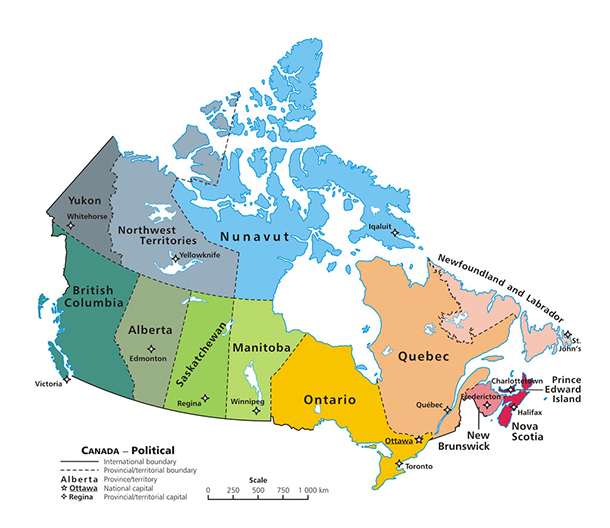
Only four of Canada’s ten provinces still rely on coal for energy: Alberta, Saskatchewan, Nova Scotia and New Brunswick (Photo: E Pluribus Anthony, Wikimedia Commons public domain)
So you're seeing from a North American perspective not only are you going to have over half of Canada with the same cap-and-trade system, but California which is the world's sixth largest economy, but now Mexico -- 123 million people -- wanting to join by 2018, 2019, and finally another key component is China, which is obviously the world's largest polluter and the world's second largest economy has announced that they will set up a national cap-and-trade system by 2018, and we've actually been working with China on their cap-and-trade system. They've sent a delegation to Québec twice now last year to learn from our system and to see how we can further collaborate.
CURWOOD: So, would this mean that if I bought a credit in Québec I might be able to use it in my factory in China?
HEURTEL: We're not there yet. No. I think that's still a ways off, but I think you're seeing from an North American perspective that there's more and more collaboration, not only in Marrakech, but throughout the past year I've had very good conversations with my counterparts in several U.S. states. We've even had European countries listed in our North American cap-and-trade system, and so what I think right now where we're at with China is more about exchanging information, exchanging data, collaborating and I think that's very encouraging for the future because ultimately what we're going to need to do -- all the nations, all the infranational states and national governments – eventually, once we get past this initial stage of adopting carbon pricing I think the next step is going to be harmonization. It's going to be about how we make sure that our systems collaborate with one another's, and I think that what we've started with China is very encouraging at that level.
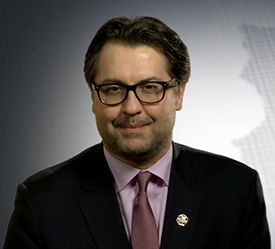
David Heurtel has served as Quebec’s Minister of Sustainable Development, the Environment and the Fight Against Climate Change since December 2013. (Photo: Assemblée nationale du Québec)
CURWOOD: And I take it that not too long from now I can buy credit in Québec and use it in Guadalajara or in Veracruz.
HEURTEL: In Mexico, definitely, so what we're looking for...right now Mexico is already setting up a pilot project and we've been working with them along with Ontario and Mexico and California rather. And so, there's definitely a path there to get us to a place where we will be linked with Mexico, but we're looking maybe it will take a few years, but it's definitely in the foreseeable future.
CURWOOD: What about this buzz on the jungle telegraph that New York State might jump into the collaboration with Québec and Ontario and California?
HEURTEL: Well, that's an exciting development. Obviously, we are open to discussions there. It's a very exciting buzz. We've heard it too, but we know there's been some interesting discussions, let's say, that have occurred leading up to Paris and since Paris, and so we're continuing those conversations, but we're definitely interested in exploring ways of working much more closely together.
CURWOOD: David Heurtel is the Minister of Sustainable Development, the Environment and the Fight Against Climate Change. Thanks so much for taking the time with us today.
HEURTEL: Great to be with you, Steve. Thank you very much.
Links
Washington Post: “Canada accelerates plan to phase out coal power, targets 2030”
A past LOE interview with David Heurtel on Canada’s fossil fuel phase-out efforts
The Toronto Star: “Liberals approve Trans Mountain pipeline, reject Northern Gateway plan”
Living on Earth wants to hear from you!
Living on Earth
62 Calef Highway, Suite 212
Lee, NH 03861
Telephone: 617-287-4121
E-mail: comments@loe.org
Newsletter [Click here]
Donate to Living on Earth!
Living on Earth is an independent media program and relies entirely on contributions from listeners and institutions supporting public service. Please donate now to preserve an independent environmental voice.
NewsletterLiving on Earth offers a weekly delivery of the show's rundown to your mailbox. Sign up for our newsletter today!
 Sailors For The Sea: Be the change you want to sea.
Sailors For The Sea: Be the change you want to sea.
 The Grantham Foundation for the Protection of the Environment: Committed to protecting and improving the health of the global environment.
The Grantham Foundation for the Protection of the Environment: Committed to protecting and improving the health of the global environment.
 Contribute to Living on Earth and receive, as our gift to you, an archival print of one of Mark Seth Lender's extraordinary wildlife photographs. Follow the link to see Mark's current collection of photographs.
Contribute to Living on Earth and receive, as our gift to you, an archival print of one of Mark Seth Lender's extraordinary wildlife photographs. Follow the link to see Mark's current collection of photographs.
 Buy a signed copy of Mark Seth Lender's book Smeagull the Seagull & support Living on Earth
Buy a signed copy of Mark Seth Lender's book Smeagull the Seagull & support Living on Earth

